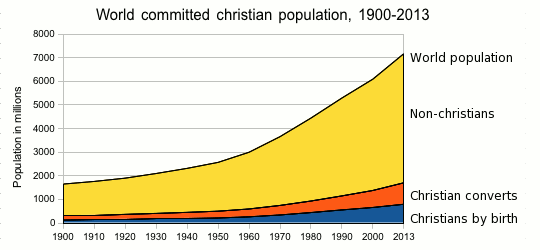The Christian faith, one of the world’s most ubiquitous religions, spans across numerous cultures and continents, rendering it a fascinating subject of inquiry for both practitioners and scholars alike. As of recent estimates, there are approximately 2.3 billion Christians globally, representing around 31% of the world’s total population. This significant demographic underpins not only the diversity inherent within Christianity but also reflects broader cultural and sociopolitical dynamics that warrant examination.
Christianity’s trajectory through history showcases a myriad of conversions, migrations, and transformations that have contributed to its expansive reach. Historically, the faith burgeoned from a small group of followers of Jesus Christ in the first century to a global religion that encompasses a vast array of denominations, each interpreting the core tenets in distinct ways. The breadth of Christian belief—ranging from Roman Catholicism, Orthodox Christianity, to Protestantism—manifests a rich tapestry of traditions that fuels both unity and diversity among adherents.
The fascination surrounding Christianity’s proliferation often raises questions regarding factors prompting this growth. An observable trend is the remarkable rise in Christianity in the Global South—particularly in Africa and Latin America—where evangelical movements and charismatic practices are thriving. This phenomenon is not merely a statistical observation but a reflection of localized spirituality resonating with millions, often providing community, hope, and meaning amid contemporary challenges.
In contrast, the Western world has seen a notable secularization and decline in church attendance. This juxtaposition invites contemplative discourse about what Christianity represents across different global contexts. In many cases, the ritualistic approaches and community engagement found in the Global South challenge the more intellectualized Christian expression typical of many parts of Europe and North America. Such divergences illustrate that Christianity is not a monolithic entity; rather, it humbly adapts to varying sociocultural landscapes.
Addressing the transformative power of Christianity requires acknowledgment of the role of missionary movements throughout history. These missions not only concentrated on converting individuals but often brought with them education and healthcare initiatives, influencing societal structures profoundly. The impact of such endeavors can be discerned in specific regions where Christianity has become intertwined with local customs and traditions, thus complicating the overall narrative of faith and demographic changes.
Furthermore, the digital age has catalyzed the dissemination of religious content across vast networks, allowing for a transnational discourse among Christians. Social media platforms, virtual services, and digital theology have rejuvenated interest among believers and the curious alike, fostering a global community that transcends geographical barriers. This phenomenon implies a future where Christianity might continue to shape and be shaped by contemporary dialogues and technologies.
Within such a burgeoning demographic, the question of the “conversion” emerges as a salient talking point. The nature of conversion varies significantly across different backgrounds. Many Christians today identify as “cradle Christians,” raised within the faith from infancy; others experience profound personal transformations later in life, often recounting compelling narratives of grace and redemption. The latter category reflects an enduring element of fascination—individual journeys that illustrate the dynamic interplay between personal experience and collective belief.
Church attendance figures illustrate another dimension of this discussion. Despite the numerical growth in Christianity, active participation in traditional church settings appears to wane in certain regions. This presents a paradox where individuals identify as Christians yet engage less frequently with institutional expressions of faith. This disengagement is particularly notable in urban areas where cultural diversity may foster an environment of pluralism, leading to heightened exploration of varied belief systems aside from Christianity.
The interplay between faith and identity further complicates the understanding of Christianity’s global landscape. In many communities, cultural identity is inextricably linked to religious affiliation. For example, in countries where Christianity intersects with national identity, such as Poland or the Philippines, the faith is often perceived as a cornerstone of societal values. Conversely, in pluralistic societies, Christians may opt for a blended identity, incorporating elements from various traditions while still grounding themselves in the Christian narrative.
This multifaceted reality invites deeper exploration into the contemporary relevance of Christianity as it navigates through the prevailing currents of modernity. The ongoing dialogue surrounding ethical concerns, social justice, and environmental stewardship illustrates a growing awareness among Christians of their role in addressing global challenges. Such issues resonate with the teachings of Christ, leading believers to reconsider how they can enact change in their communities and the wider world.
The conversation surrounding the global Christian population is far from simplistic. While numbers provide a statistical framework, they don’t capture the qualitative experience of faith that shapes individuals and communities worldwide. The Christian narrative is intricately woven into the cultural fabric of countless societies, representing an enduring source of solace, guidance, and purpose for millions.
Ultimately, understanding the question of how many Christians there are worldwide transcends mere statistics; it invites a profound reflection on belief as a transformative force. The journey of Christianity is a testament to the resilience and adaptability of faith, echoing through time as it manifests uniquely across diverse landscapes. The path ahead will inevitably present both challenges and opportunities for growth, as believers worldwide continue to navigate the ever-evolving relationship between faith, culture, and identity.



